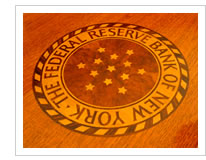
 “We can do this nice or we can do this rough.”
“We can do this nice or we can do this rough.”
—Tina Turner from Proud Mary
OK, so this morning’s on-line Wall Street Journal provides us with an excellent example of the multiple personality disorder between what we say we are doing and what we are actually doing.
Regulators Defend Bear Rescue
by Brian Blackstone and Henry J. Pulizzi
The article quotes Federal Reserve Bank of New York President Timothy Geithner as follows:
- “We judged that a sudden, disorderly failure of Bear would have brought with it unpredictable but severe consequences for the functioning of the broader financial system and the broader economy, with lower equity prices, further downward pressure on home values, and less access to credit for companies and households….”
 Mr. Geither failed to mention that his bank is the depository for the U.S. government which is now missing over $4 trillion dollars from its accounts and has refused to comply with the laws regarding publication of annual audited financial statements since 1995.
Mr. Geither failed to mention that his bank is the depository for the U.S. government which is now missing over $4 trillion dollars from its accounts and has refused to comply with the laws regarding publication of annual audited financial statements since 1995.
If my understanding of the law related to federal claims and provision of private services to the federal government is correct, based on twenty years of serving as a government official, leading a private government contractor and litigating with a federal agency and its attorney, the Department of Justice, regarding federal claims, the Federal Reserve Bank of New York and the member banks who own it and provide depository services through it, owe the Treasury $4 trillion plus from their private funds and those of their currently invisible owners.
 Not surprisingly, there was no mention of this $4 trillion plus drain of the real economy as one of the root causes of our current financial problem and the possibility of reversing this drain, nor the impact on Main Street of the entire federal budget and credit being managed with such pro-special interest lawlessness and lack of concern with productivity in the real economy.
Not surprisingly, there was no mention of this $4 trillion plus drain of the real economy as one of the root causes of our current financial problem and the possibility of reversing this drain, nor the impact on Main Street of the entire federal budget and credit being managed with such pro-special interest lawlessness and lack of concern with productivity in the real economy.
Immediately below the summary of the article was an ad for Countrywide:
 The bubble economy versus the real economy—this is the economic battle going on in our everyday lives. In the real economy, residential real estate has limited value if homeowners no longer have jobs or businesses.
The bubble economy versus the real economy—this is the economic battle going on in our everyday lives. In the real economy, residential real estate has limited value if homeowners no longer have jobs or businesses.
While some families continue to pay expenses by pulling equity out of their homes, thanks to operations like Countrywide, doing so simply accelerates the collapse of the real economy.
A real economy rises as sustainable family equity increases, whether because 1) skills and incomes are rising as a result of contributions that have real economic value in a local and global economy or 2) expenses are falling. As goes family equity, so goes community equity, and so goes regional equity, and so goes global equity in the real economy.
What is the plan to get real incomes rising and real expenses falling in a manner that creates real value in a real economy?
Unless we do so, our homes will continue to:
- Drop in value
- Causing the value of mortgages on these homes to drop in value
- Causing the mortgage securities in which they are bundled to drop in value
- Causing the derivatives layered on top of the mortgage securities to drop in value
 A bubble-economy response to these dominoes will be to refinance everything into the Federal Housing Administration (FHA) and other federal agencies. That way, mortgage securities and the derivatives layered on top of them will hold their value. Meanwhile, the Fed can simply print money to manage the collapse of the real economy underneath.
A bubble-economy response to these dominoes will be to refinance everything into the Federal Housing Administration (FHA) and other federal agencies. That way, mortgage securities and the derivatives layered on top of them will hold their value. Meanwhile, the Fed can simply print money to manage the collapse of the real economy underneath.
As my former client and HUD developer Dick Ravitch said to me over dinner at the Jockey Club in Washington in 1997, “As long as I can get government subsidies, what do I care if people have education or jobs?”
Let me suggest a reason to care about the real economy. Without a plan to turn it around and to reverse the drain of the bubble economy, there is only one way to finance existing government and pension fund commitments to Americans: to decrease the life expectancy of baby boomers.
Tina Turner says, “We can do this nice or rough.” As Wall Street bail-outs are matched by failing businesses, growing unemployment, and an inflation tax on the real economy, the chances of doing it “rough” increase dramatically.
